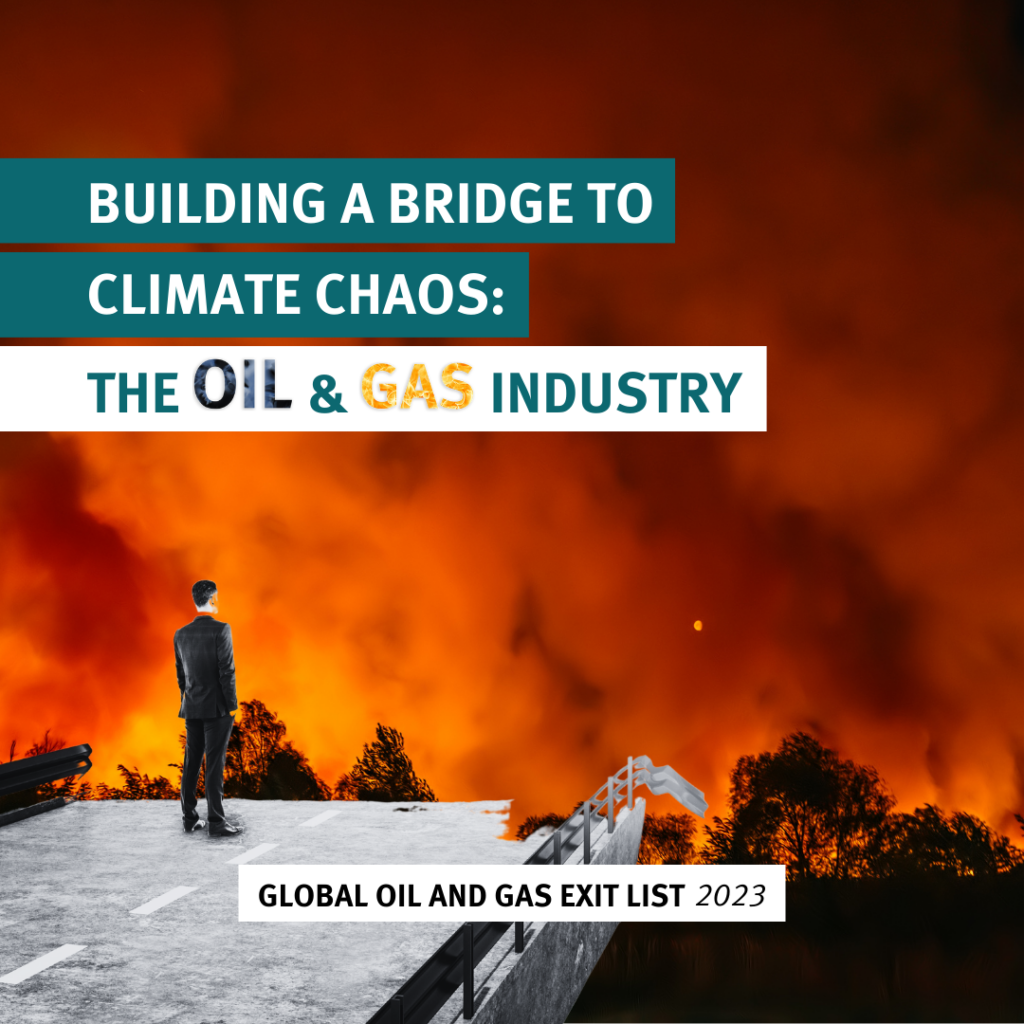The Global Oil & Gas Exit List (GOGEL), compiled by Urgewald, is a public database that identifies the largest oil & gas expansionists and the companies responsible for the most controversial forms of oil & gas production. It covers 1,623 companies active in the upstream, midstream or gas-fired power sector. Companies listed on GOGEL account for 95% of global oil and gas production. 234 financial institutions are currently using GOGEL to scan their portfolios or to develop new exclusion policies.
GOGEL is the first tool that makes it possible to systematically assess whether a company’s activities are in line with the IEA NZE scenario. It analyses oil and gas companies’ expansion plans and determines the exact share of resources that “overshoot” the IEA scenario.
Behind each company planning new oil & gas ventures, there are banks, investors and insurers without whom these projects could not be realized. GOGEL provides the information financial institutions need to stop enabling fossil fuel expansion and begin steering towards an oil & gas exit. Investors, insurers and banks need to adopt sound, data-based fossil fuel policies.
The oil and gas companies in GOGEL are on a massive expansion course:
- 96% of the 700 upstream companies on GOGEL are still exploring or developing new oil and gas fields.
- Over the past 3 years, oil and gas companies spent a total of US$ 170.4 billion on exploring for new oil and gas reserves. Since 2021, the industry’s annual capital expenditure on oil and gas exploration has risen by more than 30%.
- 539 companies are preparing to bring 230 billion barrels of oil equivalent (bboe) of untapped oil and gas resources into production in the near future.
- 1,023 companies are planning new LNG terminals, pipelines or gas-fired power plants.
- Global gas-fired power capacity set to rise by 30%.
- Industry plans 162% increase in LNG export capacity.
According to the 1.5 °C roadmap issued by the International Energy Agency (IEA) in 2021, exploration for new oil and gas reserves is no longer required and delays the energy transition.1 Since 2021, the industry’s annual capital expenditure on oil and gas exploration has, however, risen by more than 30%. Over the past 3 years, oil and gas companies in our database spent a total of US$ 170.4 billion on exploring for new oil and gas reserves that we cannot afford to burn.
GOGEL lists 384 companies whose average capital expenditure on exploration exceeded US$ 10 million between 2021 and 2023. The top 7 exploration companies are China National Petroleum Corporation – CNPC (US$ 5.9 billion), CNOOC (US$ 3.2 billion), Saudi Aramco (US$ 2.8 billion), Pemex (US$ 2.6 billion), Sinopec Group (US$ 2.4 billion), Pioneer Natural Resources (US$ 2.1 billion) and Shell (US$ 2.0 billion).
Expansion is at the core of the oil and gas business model. Before one well runs dry, oil and gas companies are already drilling the next to maintain or even increase their production levels. With every decision to drill a new well, companies are locking us into a path towards disaster. Fossil fuel emissions hit a record high last year, yet oil and gas majors like Shell, TotalEnergies and BP quickly rolled back their already weak climate pledges in 2023 – showing once again that profit goes before planet. The oil and gas industry’s so-called climate action amounts to little more than a competition in dodging accountability, making empty promises and spreading misinformation.
“Financiers and investors need to face the fact that this industry will not transform voluntarily. Private and public financial institutions, insurers, regulators and central banks must adopt policies that end the financing of fossil fuel expansion. GOGEL provides the data needed to develop and implement these policies. Without swift action, the chance for a 1.5 °C world will be irredeemably lost.”
– Katrin Ganswindt, Head of Finance Research at Urgewald
